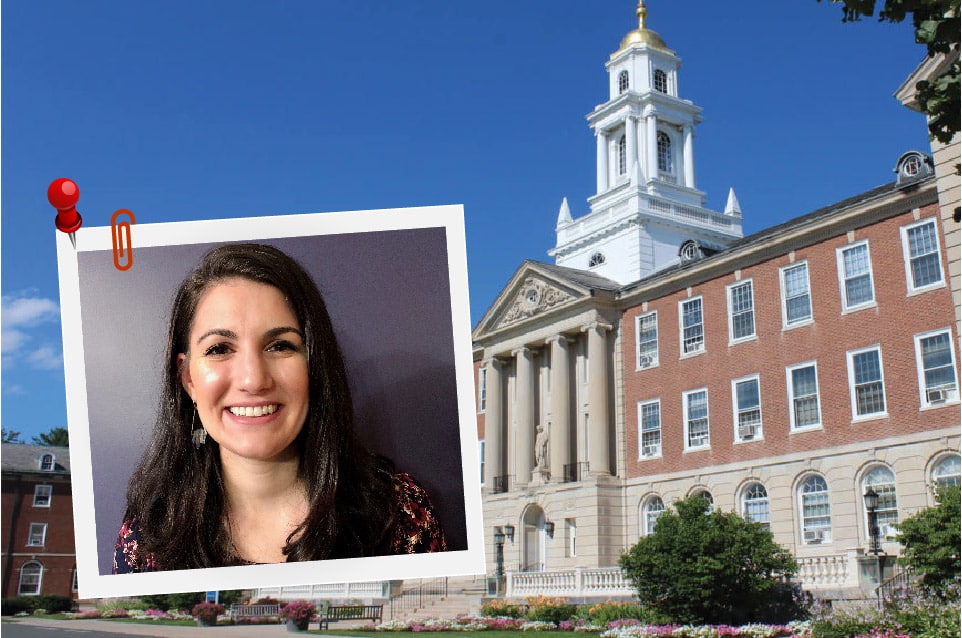Eliscia Picard graduated from University of Saint Joseph with an M.A. in Education with Multiple Intelligences Theory Concentration and currently works as a music teacher for an elementary school in Connecticut. She has more than six years of teaching under her belt and is an active member of her school’s Arts community. We asked Eliscia to tell us about her experience at University of Saint Joseph. Hear what she had to say.
Why did you want to work in education? What inspired you?
I chose to work in education for many reasons. Both of my parents were teachers when I was growing up. My mother was an elementary special education teacher and my father was a high school art teacher. Furthermore, my sister and several of my cousins are teachers. From as early as kindergarten, I aspired to be a teacher. Leading and influencing other people’s lives has always been an inspiring call to me. In kindergarten I drew a teacher sitting at a desk with a globe, an apple, and a chalkboard. Later, I dreamed of being a first grade teacher, then an English teacher, and my latest dream was to be a music teacher.
Why did you choose the University of Saint Joseph for your master’s degree in education and multiple intelligences?
Once I became a music teacher, it seemed that most colleagues in my profession would pursue a master’s in special education or music education. It seemed neither was the best fit for me, and I started to become worried that I would have to settle for what I wasn’t passionate about. The multiple intelligences program at University of Saint Joseph was suggested by a friend, and as soon as I looked into it, I called admissions. This was the perfect program to inspire me to keep dreaming as I have my whole life. I was excited at the thought of being a music teacher that could teach every subject at the same time. The program outlined classes in such diverse subjects that I knew that master’s program would lead to more enriching lessons with my students.
How has your master’s degree impacted you in terms of your current position or a position you’d like to attain in the future?
The biggest impact the program had on my teaching was my creation of a unit on Gustav Holst’s “The Planets.” With each piece of music, and with each planet, I created activities that highlighted each intelligence. Throughout the unit I incorporated dance, technology, nature observations, acting, poetry, musical composition, musical performance, art, science, history, and math.
I was also greatly impacted by the Educational Issues course and found myself a better participant in professional conversations with colleagues. The summer course also gave us the experience of meeting with Samite, a musician and storyteller from Uganda. Spending time with this artist was soulful and enriching. We were each tasked in telling and sharing our own life story. I had never felt such a cathartic release of energy and weight before; it was such a unique experience.
What was a challenge you faced during your multiple intelligences education program, and who or what helped you overcome it?
The main challenge I faced in the program was logistically getting through the day I had to attend class. The class was an hour from my work and happened to fall on a workday where I had the most classes to teach. This made the day very long. The best way I could prepare for this day was to have all of my work prepared for teaching and learning at school. It also really helped that I had prepacked my lunch, dinner, and some exciting snacks or beverages to enjoy on my drive! Aside from the logistics, each class had different levels of challenge and stress on everyone in the cohort. The courses which focused on the intelligences that are more inherent to myself tended to be less stressful to me.
What was the biggest takeaway from your master’s program?
Through taking courses designed to challenge each intelligence, I learned a lot about the intelligences that were naturally in myself. There were areas that I had not given much attention to and in turn had not treated equally in my lessons. Students have a greater chance of absorbing new knowledge when they can learn it through their best intelligence. I have since gone through my entire curriculum and added more activities, quizzes, and strategies that highlight a wider variety of intelligences.
What would you tell (or what advice would you give) prospective students considering the M.A. education with multiple intelligences theory concentration program at the University of Saint Joseph?
Through this program you will be pushed out of your comfort zone in a way that will force you to grow as a person and an educator. There will be times when it will be a lot of work, but there will be an equal amount of times where you will have fun and be creative. If something makes you feel awkward or embarrassed, dive in more! I know that I was more comfortable putting myself out there because I am often performing music.
Your cohort will have people from all backgrounds, which means that you may very well have people that feel the same as you at first. That also means there is likely to be someone who would be jumping in quickly and encouraging you to join too. If you lead in taking risks, they will follow. It is the same thing you would wish your students to do. The cohort grows in support and familiarity with each class you take, which is great because the cohort is the constant through the changing of professors.
Additionally, I suggest you create a group message to stay connected in between classes. I found it made us help each other stay on top of assignments, class expectations, and make connections of things we learned to our lives at work or home. If you are considering this program, be ready to learn a wide variety of subjects!
If you are debating between taking your classes online or on campus, I highly recommend this program. Since it meets once a week, you can still do a lot of your work on your own time. It also ensures that you get that personal connection and hands-on experience. I felt that the level of involvement from professors and peers would have been hard to match in an online course, especially with the art, theater, dance, and music lessons.
Note: As of 2021, this program name has changed to M.A. in Education with an Arts Integration Concentration


